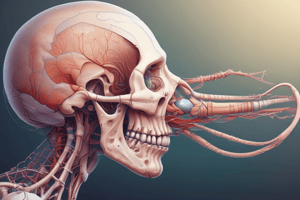Podcast
Questions and Answers
What branch of biology is concerned with the development of living organisms from conception to birth?
What branch of biology is concerned with the development of living organisms from conception to birth?
- Genetics
- Botany
- Zoology
- Embryology (correct)
Which ancient civilization can be credited with observing and documenting signs of pregnancy?
Which ancient civilization can be credited with observing and documenting signs of pregnancy?
- Romans
- Greeks
- Egyptians (correct)
- Chinese
What technological invention allowed scientists to observe the complex processes of early human development?
What technological invention allowed scientists to observe the complex processes of early human development?
- Thermometer
- Telescope
- Spectroscope
- Microscope (correct)
What is the name of the multicellular structure that forms from the zygote during the first week of human embryonic development?
What is the name of the multicellular structure that forms from the zygote during the first week of human embryonic development?
Which of the following is NOT one of the three layers that compose the human embryo by the fourth week of development?
Which of the following is NOT one of the three layers that compose the human embryo by the fourth week of development?
What part of the blastocyst will eventually develop into the extraembryonic tissues during human embryonic development?
What part of the blastocyst will eventually develop into the extraembryonic tissues during human embryonic development?
What is one crucial event in embryology according to the text?
What is one crucial event in embryology according to the text?
Which process involves the union of a sperm and an egg?
Which process involves the union of a sperm and an egg?
From which germ layer does the central nervous system originate?
From which germ layer does the central nervous system originate?
What does the blastocyst do during implantation?
What does the blastocyst do during implantation?
What does genetic reprogramming allow for in embryology?
What does genetic reprogramming allow for in embryology?
At what point in development does the embryo consist of various organs and systems?
At what point in development does the embryo consist of various organs and systems?
Flashcards are hidden until you start studying
Study Notes
Embryology: Understanding the Development of Life
Origins of Embryology
Embryology is the branch of biology concerned with the development of living organisms from conception to birth. Its origins can be traced back to ancient Egyptians, who observed and documented the signs of pregnancy, including menstruation, morning sickness, and the size of the woman's belly. However, the modern scientific study of embryology began in the seventeenth century with the invention of the microscope, which allowed scientists to observe the complex processes of early human development.
Human Embryonic Development
Embryonic development is a complex series of processes involving cellular divisions, migrations, and pattern formation that result in the formation of a multicellular organism. The human embryo undergoes several stages of development. During the first week, the zygote experiences mitosis, leading to a multicellular structure called the morula. By the end of the second week, the morula transforms into a blastocyst, which then implants itself in the uterine wall.
During the third week, the blastocyst begins to differentiate, forming the inner cell mass and the outer cell mass. The inner cell mass will become the embryo proper, while the outer cell mass forms the extraembryonic tissues. In the fourth week, the embryo is composed of three layers: the ectoderm (outer layer), mesoderm (middle layer), and endoderm (inner layer). Over the next four weeks, numerous key events occur, such as the formation of the primitive streak, the appearance of the heart, and the development of the central nervous system.
By the end of the eighth week, the embryo consists of various organs and systems, progressing towards maturity in the subsequent weeks.
Crucial Events in Embryology
Some crucial events in the field of embryology include:
- Gamete Approximation: The union of a sperm and an egg leads to fertilization. Both the sperm and egg must navigate the female reproductive tract and come together in the appropriate locations.
- Implantation: The blastocyst embeds itself in the uterine wall, initiating the process of placentation and ensuring nutrient exchanges between mother and offspring.
- Development of the Central Nervous System: The central nervous system (brain and spinal cord) is formed from the ectoderm, with important milestones occurring throughout the developmental stages.
- Genetic Reprogramming: The generation of complete human day 14 post-implantation embryo models from naive ES cells demonstrates the potential for direct manipulation and understanding of early human development.
Conclusion
Embryology is a fascinating area of study that provides insights into the origins of life and the processes that shape our existence. Through rigorous research and observation, scientists continue to unravel the mysteries of human development and contribute to advancements in medicine and health care. As we explore new frontiers in embryology, our understanding of life's beginnings expands, offering us a deeper appreciation of the complexities of biological development.
Studying That Suits You
Use AI to generate personalized quizzes and flashcards to suit your learning preferences.



